Ebulletin #123
19th December 2024
|
We have another bumper edition of the Irish Penal Reform Trust (IPRT) online newsletter including a message from the IPRT Executive Director, updates about our General Election campaign, new IPRT job opportunities, work on youth justice, Traveller justice and more.
End of Year Message from IPRT Executive Director
 As we reflect on another impactful year at IPRT, I want to express my deepest gratitude to everyone who has supported our mission to advocate for a progressive criminal justice system that prioritises alternatives to prison, upholds human rights, and champions reintegration.
As we reflect on another impactful year at IPRT, I want to express my deepest gratitude to everyone who has supported our mission to advocate for a progressive criminal justice system that prioritises alternatives to prison, upholds human rights, and champions reintegration.
This year we’ve shared many of our successes in our quarterly newsletter updates and had rich conversations at our events and AGM - your engagement has been invaluable. Our dedicated team has worked tirelessly to ensure our work remains relevant and influential, maintaining a strong voice for reform.
While we’ve seen some encouraging commitments to progressive penal policies during the General Election campaign and beyond, the urgency for action remains clear. With Ireland’s prison population reaching record highs, we’re seeing increased strain on essential services, a deterioration in living conditions with more people having to share cells or sleep on mattresses, and a growing need for systemic change. Reducing reliance on imprisonment and expanding access to community-based alternatives must be priorities in the coming year.
IPRT will continue to advocate fearlessly, ensuring promises are kept, rights are upheld, and that progress is both tangible and transformative.
On behalf of the IPRT team, I wish you all a peaceful festive season and a hopeful New Year. Thank you for standing with us.
Saoirse Brady
IPRT Executive Director
SOME KEY POINTS FROM THE LAST QUARTER
General Election 2024
This year, IPRT focused extensively on shaping the conversation around penal reform in the lead-up to the general election. Along with the promotion of our own manifesto asks, we hosted a dedicated hustings event, bringing together candidates from key political parties to discuss solutions to overcrowding, alternatives to imprisonment, and addressing the root causes of crime.
We created an online Election Hub full of resources including party manifesto reviews, assessments of progress from the last elections and resources to help people to ask candidates in their constituency relevant questions linked to our work. We also launched new polling data (see more below) revealing strong public support for these reforms and shared evidence-based policy recommendations with all parties. We are continuing our work and will be engaging with newly elected TDs to influence the Programme for Government. Read our Key Asks for the Programme for Government 2025+.
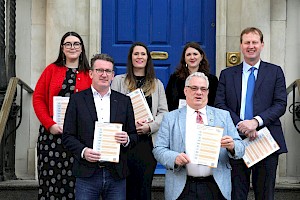

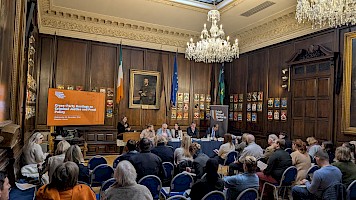
L-R: Pamela Drumgoole (IPRT), Aodhán Ó Ríordáin (Labour Party), Sinead Gibney (Social Democrats), Aengus Ó Snodaigh (Sinn Féin), Saoirse Brady (IPRT), and Jim O’Callaghan (Fianna Fáil) with IPRT’s General Election manifesto asks ahead of IPRT’s hustings on penal reform at the Mansion House, Dublin.
IPRT and RED C Public Attitudes Polling
In November, IPRT released the results of a new public opinion poll conducted by RED C to gauge public opinion on a range of issues related to prison and the criminal justice system.
Some of the key findings include:
-
Four out of five people (81 per cent) believe it's important for the incoming Government to focus on alternatives to prison for non-violent offenders in the next programme for the government. Support is consistently high across voters of the main political parties and independents. Excluding those who answered ‘Don’t know’, this rises to 86 per cent.
-
Most feel that offenders with either mental health (71 per cent) or addiction difficulties (63 per cent) should receive treatment in a dedicated facility instead of being sent to prison. This strategy in addition to community service, are the most favoured approaches to tackle overcrowding in Irish prisons.
-
More than two out of three people (68 per cent) believe building prison spaces is not the solution to deal with prison overcrowding and that crime should be tackled at its root, while only a third (32 per cent) believe that crime levels would reduce as a result of increased prison spaces.
-
When given options as to what measures should be implemented to tackle crime, 41 per cent chose additional Gardaí over other measures, followed by drug treatment places with continuing care (21 per cent) and youth services (10 per cent).
-
One out of two people think that people leave prison worse than they went in.
Read our press release on the results.
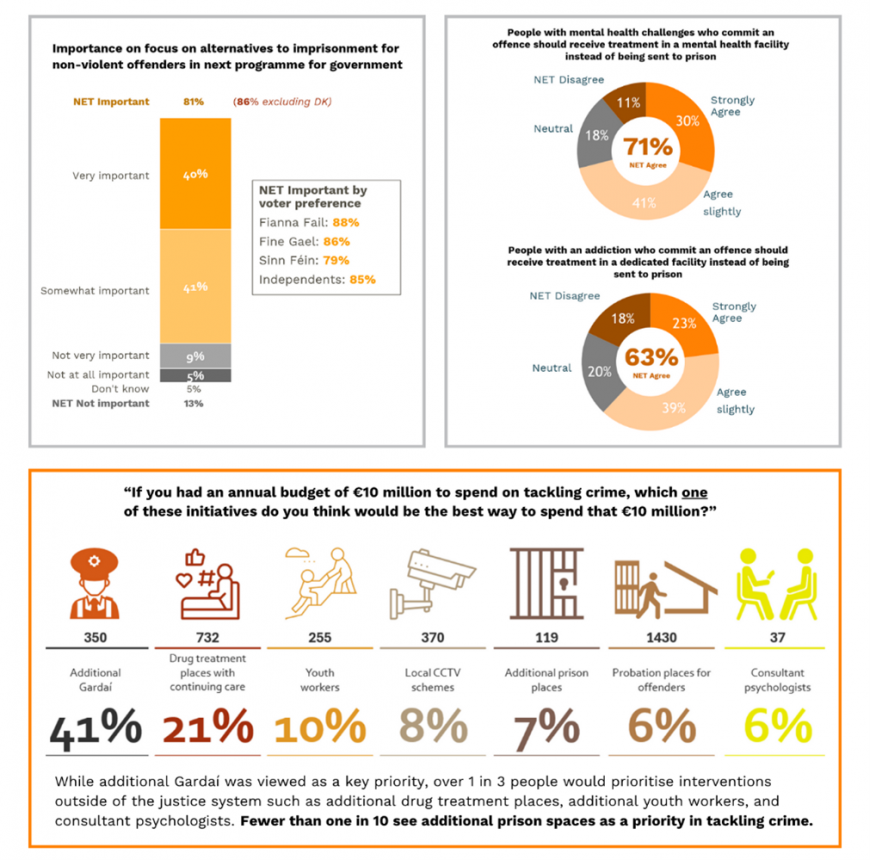
Irish Prison Service Annual Report 2023
In December, the Irish Prison Service (IPS) Annual Report 2023 was published. The report highlights key statistics on committals, prison capacity, sentence length and the increased cost of imprisonment.
In response, IPRT calls for the next Programme for Government to focus on a humane and solutions-focused approach to addressing and alleviating the severe pressures on our criminal justice system evident in the report.
The IPS Annual Report 2023 shows a significant increase of people committed to prison in Ireland in 2023 including an increase in people committed on short sentences of less than 12 months, more women imprisoned and nearly a tripling of the number of people being imprisoned for non-payment of fines.
IPRT is hiring for two roles
-
IPRT is recruiting a Legal, Policy and Public Affairs Manager. This position involves covering a senior role within the IPRT team, with responsibility for overseeing and implementing our legal, policy and public affairs programme of work to ensure lasting penal policy reform is embedded in law and practice. The deadline for applications for this role has been extended to 5pm Monday 13 January 2025.
-
IPRT is also hiring a Policy and Research Coordinator. This is a key function within the IPRT team, developing and coordinating our comprehensive body of evidence-led research and policy outputs to influence public and political debate. The deadline for applications is 5pm on Monday 13 January 2025.
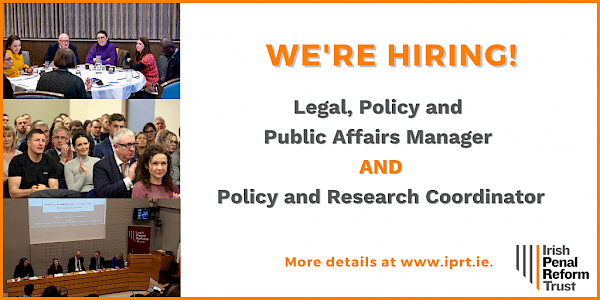
IPRT Civic Society Partnership projects
Report: ‘Access to Justice: Legal Pathways to Justice for the Rights of People in Prison’
In November, Dr Amina Adanan of Maynooth University published ‘Access to Justice: Legal Pathways to Justice for the Rights of People in Prison’. The report explores the law and practice of public interest prison litigation in Ireland, examining the obstacles and issues that are present and the factors that contribute to this overlooked area of law. It makes nine recommendations for reform and builds on previous research by IPRT which identified that there is a need for an increase in public interest litigation to advance the rights of people in prison in Ireland. This research was supported by the research assistance of Andrea Pownall, funded by the Irish Research Council with IPRT acting as the civic society project partner for this research.
The accompanying launch has been postponed until 2025 once Dr Adanan returns from maternity leave and in the meantime we wish her our warmest congratulations on the new arrival.
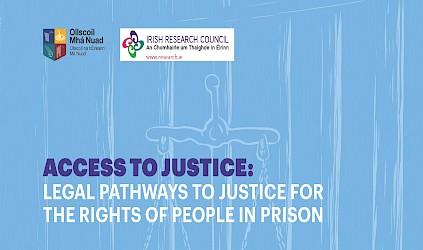
Report: Boxed Out
IPRT was also the civic society project partner for the research report Boxed Out: Higher Education, Criminal Convictions, and Perceptions of Risk funded by the Irish Research Council. The research focuses on Higher Education Institutions' admissions policies and practices regarding people with convictions in Ireland. The evidence will aid the development of fair admissions policies and practices to reduce barriers and stigma.
The research, led by Dr Joe Garrihy and Dr Ciara Bracken-Roche of Maynooth University School of Law and Criminology, was launched on 13 November 2024 as part of a larger event 'New Opportunities: Higher Education Pathways for People with Convictions'.
IPRT Policy and Research Coordinator, Pamela Drumgoole, opened the event highlighting the importance of the report and how it builds on the data from “The Secondary Punishment”: A Scoping Study on Employer Attitudes to Hiring People with Criminal Convictions, supported by the Irish Human Rights ad Equality Commission and the Open Doors Initiative, and published by IPRT earlier in the year.
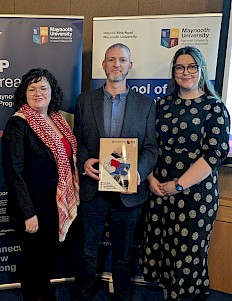

Dr Ciara Bracken-Roche, Dr Joe Garrihy and Pamela Drumgoole at the launch.
Department of Justice's Employment Strategy
In November, IPRT attended the motivational launch of the Department of Justice's Building Pathways Together: Criminal Justice Reintegration Through Employment Strategy 2025-2027. We are heartened to see many recommendations from IPRT’s The Secondary Punishment report reflected in the actions.
The infographic accompanying the new strategy draws on previous research by SOLAS and IPRT that demonstrates the appetite amongst many employers to employ people with convictions.
The establishment of a Criminal Justice Employer Network is a key part of the strategy. The Network will provide an opportunity for employers to offer feedback, ask questions, and share information on hiring people with criminal convictions. The Department of Justice is now seeking expressions of interest to be part of this network at BPT@justice.ie.
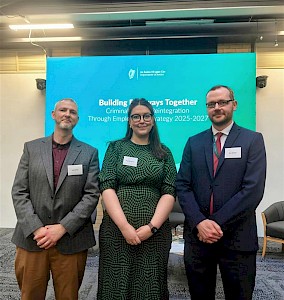

L-R: Dr Joe Garrihy (Maynooth University), Pamela Drumgoole (IPRT) and Kenneth Keating.
Children and Families of people in prison
-
Halloween Kids Camp
This Halloween, Ashling Tobin, the IPRT Children and Families Initiative Coordinator joined families at Shelton Abbey open prison for their Halloween Kids Camp. The event was a heartwarming sight where some of the men and their children got to spend proper quality time together. Maintaining positive family contact is a crucial factor in the rehabilitation of people in prison. It can be difficult for children to maintain a relationship with their parent in prison. Initiatives like this one can improve the experience for families.

Ashling Tobin at the Shelton Abbey Halloween Kids Camp.
-
Research on exploring the financial impact on children and families in Ireland when a family member is imprisoned
Following a competitive tender process, IPRT has commissioned TASC to investigate how a family’s finances and wellbeing are affected when a family member is imprisoned and whether current financial difficulties worsen or if new ones arise. As part of this important research, we will be conducting a survey of people with experience of having a family member in prison over the past two years. The researchers will also hold focus groups in the new year. For more information on how to get involved contact Ashling at atobin@iprt.ie.
Traveller Justice Initiative
In October, the Council of Europe Commissioner for Human Rights, Michael O’Flaherty, visited Ireland to address the access to rights situation of Travellers and Roma.
He accompanied Anne Costello, coordinator of the Traveller Justice Initiative (currently hosted by IPRT) and Maria Joyce from the National Traveller Women's Forum on a visit to the Dochás Centre, the women’s prison at Mountjoy Prison. Michael and his team met with Traveller women in the Dochás Centre to hear of their experiences directly.
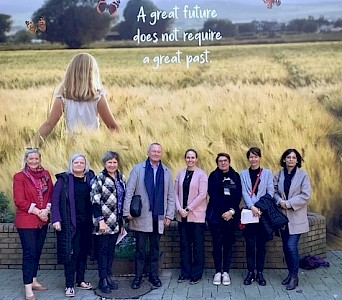
Anne Costello and Maria Joyce with Michael O’Flaherty and his team.
In November, Anne Costello presented to European Law Students’ Association (ELSA) members in Galway University in November about Travellers in Prison. There was great engagement and discussion with the students at the event.

Anne Costello presenting to students in Galway.
Advocacy meetings
-
In November, IPRT was invited to present to the Working Group on Future Prison Capacity, chaired by John Murphy and comprising officials from across the criminal justice sector and other experts. The Group has been tasked with making recommendations on the numbers and types of prison capacity needed up to 2035. We focused on the principle of prison as a last resort and reducing prison capacity needs through alternative measures. Following the meeting, we provided a short written submission to the Group to inform their work.
-
IPRT Executive Director, Saoirse Brady and Anne Costello, TJI Coordinator, recently met with His Honour Paul Kelly, President of the District Court and Judge Susan Fay. They highlighted IPRT’s work in the area of sentencing and discussed alternatives to prison including restorative justice.
-
IPRT attended the Parole Board’s inaugural conference in Smock Alley Theatre. The speakers provided an important overview of the everyday work of the Board along with best practice examples or learnings from other jurisdictions which could be considered here. Despite being a challenging area of work - given the complexities of balancing the rights of everyone involved - the panel discussions were insightful and sensitively managed.
-
IPRT attended and presented at the Youth Diversion Project Conference in Croke Park to a room full of dedicated and innovative people working in the youth justice system alongside some of the inspiring young people they work with. The showcases from Gaisce - The President's Award, KEEP YDP, Foróige, Kerry Community Youth Service (KCYS) and others demonstrated the powerful impact of youth diversion and the difference it can make. IPRT’s contribution titled ‘Youth Justice Strategy: Reform, Priorities and Impact’ is available on our website.
Recent submissions
-
IPRT recently made submissions to the Department of Children, Equality, Disability, Integration and Youth’s (DCEDIY) consultation to inform the State’s report to the Committee on the Elimination of Racial Discrimination (CERD).
-
We also contributed to the Jury Reform consultation, and to the Working Group on Future Prison Capacity (see more detail for this above).
IPRT in the News
Below are some media highlights featuring IPRT. To read the full list of our media appearances, visit our IPRT in the News webpage.
- The Journal: Close to 13% increase in number of committals to prison last year, according to new report
- Irish Times: Prison watchdog warns of ‘immense task’ in tackling overcrowding in Irish jails
- Newstalk: Mountjoy Prison chapel closed due to overcrowding
- Irish Examiner: Alternatives to prison in cases of non-violent crime urged
- Echo Live: Record breaking inmate numbers at Cork prison 'poses clear risks', says Irish Penal Reform Trust
- Galway Pulse: Voting in Prison: ‘I didn’t engage with that process because I didn’t feel part of that system’
- Echo Chamber podcast: Imprisonment as a last resort
Prison Life Index
IPRT welcomes the launch of a new resource called the Prison Life Index - a new composite index that evaluates the respect for the fundamental rights of people in prison across the world. It provides an overview of detention conditions, country by country. The first version of the Prison Life Index covers 12 countries, including Ireland.
Ireland was evaluated on a number of the indicators and received scores ranging from A (compliant with international standards) to E (Not at all compliant with international standards).
Ireland received A-ratings for indicators such as - people in prison having access to drinking water, access to personal hygiene products and access to clothing, among other standards. However, there were frequent violations noted in terms of sufficient living space, sleeping conditions and adequate facilities to maintain personal hygiene. Ireland received E-ratings for some indicators under 'Complaint, appeal and inspection measures' as Ireland has not yet ratified the Optional Protocol for the Convention against Torture and does not have a National Preventive Mechanism. The index highlighted that while a complaint system exists for people in prison, the European Committee for the Prevention of Torture deemed that this system “could not be considered fit for purpose in all cases”.
Sector News
- Sentencing Guidelines and Information Committee reports – District Court Research and Community Sanctions in Ireland.
- CSO: Probation recidivism 2020 cohort
- Office of Inspector of Prisons: Watchdog Inspects Limerick Women’s Prison and returns to Cloverhill Prison.
Thank you!
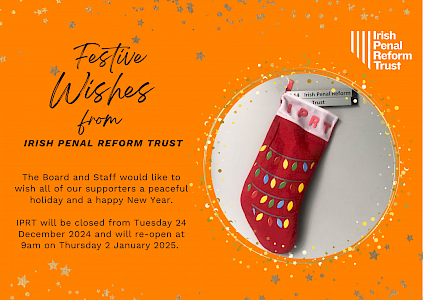 Thank you for your continued support this year. None of our work would have been possible without our supporters. Whether you have supported us financially, shared our messages online, given us feedback on our work or cheered us on from afar, our year would not have been the same without you.
Thank you for your continued support this year. None of our work would have been possible without our supporters. Whether you have supported us financially, shared our messages online, given us feedback on our work or cheered us on from afar, our year would not have been the same without you.
As always, feel free to get in touch with any feedback or comments on our work. The best way to get real-time updates on our work is to join us on social media.
The IPRT office closes on Tuesday 24 December 2024 and will re-open at 9am on Thursday 2 January 2025. You can email us at info@iprt.ie and we will respond on our return.
Read previous editions of IPRT newsletters.
|




